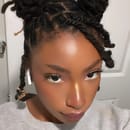It’s a regular Sunday afternoon, the heavy but feathery footsteps of my mother descend from the upper story of our house coming to ruin my WWE Royale battle with my brother to slay the fairytale dragon that is … my mane.
To an early 2000s little black girl getting your hair done smelled of Sulfur 8 and oils. Pointy combs, rubber bands and barrettes laid on the couch to my mother’s side.
This to me is a cultural experience, it is something I could only explain to someone and they would never understand until they lived it. Sitting between my mother’s legs as she neatly tucked and toiled my hair preparing me for another week of school.
As I got older I began to miss the days the TV blasted the Investigation Discovery channel as she buried her attention into the intricacies of my hair.
Black culture is rooted in our hair. It is a symbol of creativity and freedom from European beauty standards. Surprise surprise, black women were not allowed to wear their hair in the state it grew from their beautiful scalps. It was “not socially acceptable.”
In early African civilizations, you could find all the information you would need to know about a person based on how they wore their hair. Their tribe, their marriage status and the war status of their tribes. They believe because of their hair’s proximity to the sky it can be used to connect with God.
The modern policing of black hair was put in place in order to preserve the sanctity of white spaces and subscribe to white professionalism. Black people have not been accepted in America so the evolution of black hair over time is directly indicative of race relations in America.
When displaced in the Trans-Atlantic Slave Trade, African woman brung their own handmade wide tooth combs to America with them. But from this point to the unknown future, African people did not have the luxury of personal care.
People like Madam C.J. Walker, Angela Davis, and Bob Marley paved the way for different hair movements for black women.
In the early 1900s, Madam C.J. Walker became the first Black American millionaire for selling hair care products. Walker was known most for her invention of hair formulas for growth, moisture, and her hair straightening formulas made specifically for black women. Giving women the option to treat their hair with something better suited for them, but also remain polished and have the ability to assimilate to their white counterparts.
Rastafarian theology popularity in the 1930s from the ideas of Marcus Garvey bred the popularity of the “roots” movement as well as the dreadlocks. Bob Marley brought increased popularization to locs about 4 decades later. Dreadlocks are one of the most prolifically profiled black hairstyles.
These implications are not only rude, but they are racist and are often used to ostracize black folks in white spaces.
Angela Davis and the black panther party brought the pride of the Afro to the American beauty forefront. This is when the popularity of the Afro pick became popular. Black men and women were known to “preen” their afros into perfect circular halos around their heads like crowns made by a fine hedge artist. Encouraging a love of African hair in one of its most natural states.
All in all, our hair is a journey through our history and perseverance. These were just a few examples of the cultural significance behind the hairstyles you see on your everyday beautiful black women (or men).
Though our hair defines us, your hair will never fully define YOU.
And as my high school senior quote said, “Remove the kinks from your mind. Not your hair.”


